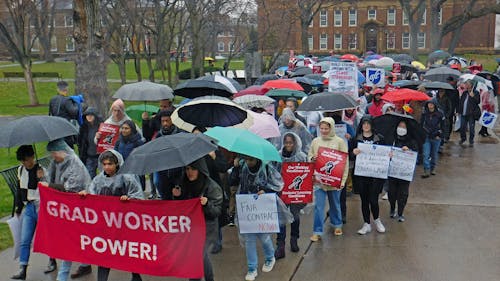Rutgers AAUP-AFT gathers hundreds in continued fight for fair contracts

Yesterday, hundreds of faculty, staff and students on all three University campuses joined together in a rally during the Board of Governors meeting to push for the establishment of fair contracts.
In April, graduate students from the Rutgers chapter of the American Association of University Professors and American Federation of Teachers (AAUP-AFT) protested for funding extensions outside the Board of Governors meeting, as previously reported by The Daily Targum.
Rebecca Kolins-Givan, president of the AAUP-AFT, said that University administrators did not respond to this event and that many graduate students were forced to bear the consequences.
"Largely through their own efforts, some of these grads did find funding through their departments and elsewhere, but others had to settle for inadequate funding, and some were cut off with nothing and had to decide whether to give up on their degrees," she said.
Kolins-Givan said that the AAUP-AFT’s proposal for the University to commit to one year’s worth of full funding for Ph.D. students who were enrolled during the coronavirus disease (COVID-19) pandemic and need additional funding for degree completion was "basically rejected" by administration. Instead, departments and individual programs were expected to provide students with funding at their own expense, she said.
On September 23, the AAUP-AFT hosted a rally outside Alexander Library on the College Avenue campus before University President Jonathan Holloway’s "State of the University" address. Approximately 250 individuals mobilized to emphasize the needs of the union as they have been without contracts since July. This was met with little response from administration, according to a statement from the AAUP-AFT.
In October, the AAUP-AFT gathered for the Board of Governors meeting in Camden, where they discussed their ongoing request for proposals to formally establish equity for faculty members at the University’s Camden and Newark campuses, Kolins-Givan said. The University, though, did not restart negotiations with the unions until November, she said.
Yesterday's action took place on the College Avenue campus and came after proposals for specific details regarding faculty contracts were presented in May.
"On all of the major proposals we have put forward, the administration has either rejected them in their entirety or not bothered to respond," Kolins-Givan said. "We've come to expect delay tactics and obstacles from the Rutgers administration, but this is outrageous."
The event consisted of a march to the Board of Governors meeting at Winants Hall, as well as speeches by national union representatives, including Randi Weingarten, president of the AFT, and Irene Mulvey, president of the AAUP.
Weingarten began her speech with a chant in support of fair contracts. She said that Rutgers, as the preeminent public university in the state, should act in the interest of the common good.
She said that while issues related to the COVID-19 pandemic affected higher education institutions across the nation, the University was able to continue serving students due to the efforts of tenured faculty, adjunct faculty and lecturers. For this reason more than any other, faculty members deserve fair contracts immediately, she said.
In addition, Weingarten urged University administrators to set negotiation dates and bargain fairly regarding health care benefits for adjunct faculty and equal pay with the AAUP-AFT in order to show respect and fairness to faculty members.
"We do not want to negotiate in the press or out on the streets," she said. "But if you do not want to negotiate and problem-solve, then we will be out on the streets."
Christine O’Connell, president of the Union of Rutgers Administrators-AFT, said that the union has been negotiating a contract since April, with a focus on compensation as well as provisions for telework and being overworked for administrative staff.
"We are the backbone of the University. We work in every academic department. We work in every business department," she said. "Without our work, this University would not function."
O’Connell said that administrative staff have demonstrated their skill in their jobs, but are faced with a lack of both compensation and recognition, which then creates issues with recruitment and retention.
She said that while the union has received very little or no response from University administration thus far, the union hopes to bring improvement to the broader community beyond just union members.
O’Connell said that ideally, faculty members would receive compensation that fairly reflects their job duties as well as the high costs of living and working in New Jersey. In addition, they hope to have more of a voice in decision-making within bargaining, which is representative of many different departments, she said.
"Our proposals are inclusive, and we try to think of how to benefit everyone," O’Connell said. "As opposed to unilateral policy creation from the management, we want a collaborative environment."
Catherine Monteleone, president of the AAUP-Biomedical and Health Sciences of New Jersey (AAUP-BHSNJ), said that the medical faculty union has faced similar issues as the AAUP-AFT. She said these include insufficient and inequities in pay for union members, as well as shortened tenure and contracts when compared to their peer legacy Rutger faculty members.
Specifically, Monteleone said that many faculty members at the Rutgers Biomedical and Health Sciences are paid, at most, to the 25th percentile of their peers. At the same time, she said 11 Rutgers administrators were paid $6 million in bonuses.
Kolins-Givan said this is particularly frustrating because the University imposed budget cuts and laid off more than 1,000 employees while receiving COVID-19 relief funds from the federal government as well as state assistance.
Specifically, Rutgers received $365 million in pandemic relief funding and its unrestricted reserves, which is money that can be used to solve financial emergencies, grew by approximately 61.5 percent to reach $818.6 million, according to research done by union members.
"We all sacrificed during the pandemic, and meanwhile, the administration was sitting on a growing pile of money," Kolins-Givan said. "That's money that has to be used now to meet the urgent needs that are so glaringly obvious. Rutgers works because we do. And we have the power to make it stop working, too, if that’s what it takes to get the administration to pay attention."
Amy Higer, president of the Rutgers Adjunct Faculty Union (PTLFC), said the administration has not responded to union requests for part-time lecturers to receive the same pay per credit hour as full-time faculty, especially since there are no differences in the courses that are taught by part-time or full-time lecturers or how students interpret their lessons.
"Rutgers PTLs teach tens of thousands of students every semester," Higer said. "We teach the exact same courses as full-time faculty, and yet we’re paid a fraction of what they earn. Our students often see no difference between us and full-time faculty members, but Rutgers’ top administrators treat us as disposable. Enough is enough. It’s time to increase the pressure."
In addition to pay issues, Monteleone said that the privatization of labor has significantly affected employees at RBHS.
"We have faced the outsourcing of union work to a non-union private health system, RWJBH. Our faculty are poorly paid in comparison to national standards," Monteleone said. "We have pay inequity among our existing faculty along gender and age lines."
She said that while a majority of union faculty signed a petition in favor of merging the full-time faculty union contracts, the University did not recognize the agreement.
If administration does not respond to union concerns, Monteleone said that unions will escalate action in order to continue supporting part-time lecturers and legacy University faculty. This escalation may take the form of "work action" during the Spring 2023 semester for which AAUP-AFT members have already trained for, Kolins-Givan said.
"None of us want to strike or disrupt our classes and research," she said. "But we need the administration to pay attention: They need to address the urgent needs and issues we've identified."
The continued frustrations of the AAUP-AFT are now gaining national attention, as Sen. Bernie Sanders (I-Vt.) tweeted in solidarity yesterday.
"It is unacceptable that while Rutgers University has an endowment of nearly $2 BILLION dollars, their workers are struggling to get by," Sanders said on Twitter.
Kolins-Givan said that yesterday’s demonstration partly takes inspiration from similar events occurring across the country.
On Monday, unions that represent 48,000 academic workers reached the fourth week of their sit-in strike at the University of California, which is now considered to be the most significant strike in the history of higher education in America, according to an article from The Guardian.
On the East Coast, approximately 1,800 unionized adjunct faculty members at the New School and Parsons School of Design in New York City entered their third week of protesting working conditions and pay on Monday, according to an article from The New York Times.
"We want to show that full-time and adjunct faculty, grad workers, postdocs, staff and students are united," Kolins-Givan said. "There's a strike wave going on in higher education, from California to New York City, and the Rutgers administration needs to understand that they'll find themselves facing something similar if they don't negotiate fair contracts that meet our demands."
The University responded to the Targum's request for comment with a statement from University spokesperson Dory Devlin.
"We continue to negotiate in good faith and on a regular basis with Rutgers' unions," Devlin said. "All mandatorily negotiable issues related to those employee contracts will be discussed at the negotiating table with the appropriate bargaining team representatives from the administration and the unions."



